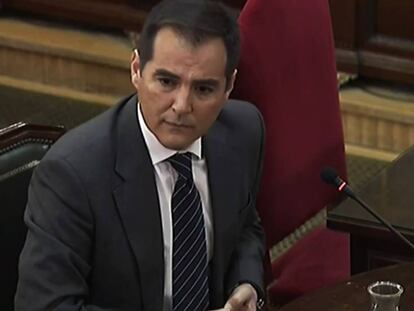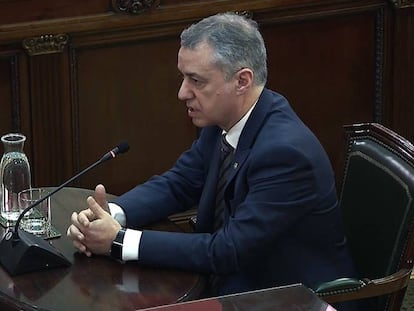Catalan speaker: “We will never give up on the will to decide our own future”
At the ongoing Supreme Court trial of pro-independence leaders, Roger Torrent defends the actions of his predecessor, who allowed breakaway laws to be debated in parliament
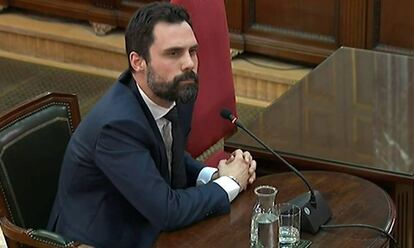
Roger Torrent, the speaker of the Catalan parliament, testified on Monday at the ongoing trial of separatist leaders in Madrid, where he made a political statement in favor of self-determination.
“We will never give up on the will of a majority of Catalans to decide our own future. I voted on October 1, and keep in mind that we will vote again,” said Torrent, alluding to the unauthorized independence referendum held on October 1, 2017.
I asked Carles Puigdemont to stop his suicidal behavior
Enric Millo, ex-government delegate in Catalonia
Twelve Catalan political and civil society leaders are being tried for their role in the events leading up to the referendum and the unilateral independence declaration that followed in late October. They face charges ranging from disobedience to rebellion over acts alleged in the courts to have been unconstitutional.
Torrent, of the pro-independence Catalan Republican Party (ERC), answered questions about the breakaway laws that were passed in the Catalan parliament, particularly why these were brought to the floor in the first place despite warnings from the parliament’s own legal counsel.
The speaker defended his predecessor, Carme Forcadell, who is being tried for her role in the independence bid. Torrent said that the parliament’s top officers, assembled in a speaker’s committee known as the Mesa, had the duty to put the breakaway laws to a vote because the Mesa is an impartial body whose role “does not include assessing proposals, no matter how unconstitutional they might seem.
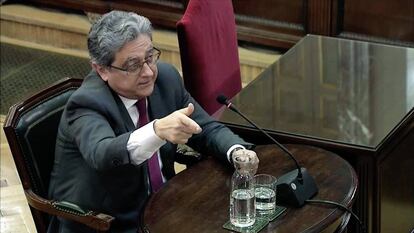
“I would have done exactly the same thing in her place […], and protect the participation rights of all the parliamentary groups,” he told the panel of seven justices who are trying the case at the Supreme Court.
But his views were contradicted by two other witnesses who took the stand on Monday: Xavier Muro, the secretary general of the Catalan parliament, and Antoni Bayona, its former chief counsel. Both men headed the chamber’s legal services at the height of the independence bid.
Muro and Bayona underscored that the Mesa has a duty to reject initiatives that are clearly unconstitutional. They also said they warned former speaker Forcadell as well as the other members of the Mesa, verbally and in writing, that the Constitutional Court had ordered a halt on all parliamentary proceedings aimed at achieving unilateral independence.
Sensing disobedience
The parade of witnesses – as many as 600 have been called in to testify over the coming weeks – continued on Tuesday. Neus Munté, a former Catalan government official, said that she could “sense a scenario of disobedience” and decided to resign in July 2017, a few months before the unauthorized referendum and independence declaration. And Enric Millo, a former Spanish government delegate in Catalonia, said that he asked the Catalan premier at the time, Carles Puigdemont, “to stop his suicidal behavior.”
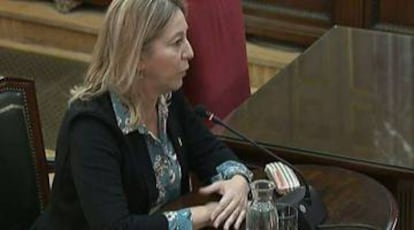
Millo also said that there were “episodes of harassment, violence and intimidation” by pro-independence supporters. “Throwing incendiary objects, spray-painting intimidatory messages, and pointing out police officers... this is violent,” he said, positing that these actions were the work of the self-styled Committees to Defend the Republic (CDR), grassroots groups behind roadblocks and other forms of street protest.
Whether violence was employed at any time during the secession attempt is crucial to upholding the most serious charge of all: rebellion. Puigdemont is not himself on trial because he fled Spain to avoid arrest, and a German court refused to extradite him on the rebellion charge, only for misuse of public funds. The Spanish judge in charge of the case decided to drop the international arrest warrant rather than try the leader of the secession attempt on lesser charges than his aides are facing.
English version by Susana Urra.
